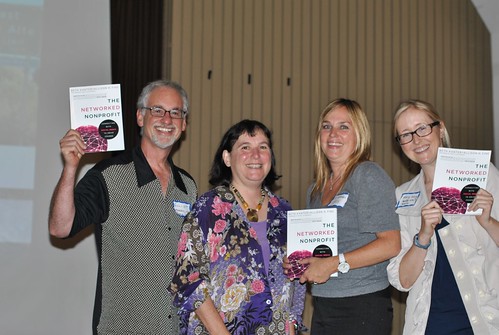As part of my work as Visiting Scholar for Social Media and Nonprofits at the David and Lucile Packard Foundation, I’ve had the pleasure to do a number of workshops in the area. Last evening, I had the pleasure of presenting a Networked Nonprofit mini-workshop for a group of about 50 local nonprofits and government agencies in Palo Alto hosted by the Palo Alto Community Fund.
The participants represented a wide range of nonprofits from all-volunteer groups to larger institutions. The individuals included both staff and volunteers as well as different generations. I keep hearing from the “older generation” how aware they were of the importance of social media, but how difficult it was to change mindsets. After the session, I hear many say how they planned to go back and begin the transformation towards being a networked nonprofit!

One of the highlights is that I finally got to meet Enoch Choi who is a doctor at the Palo Alto Medical Foundation and uses social media. I first “met” Enoch online through Netsquared in 2006 when I was putting together a presentation on nonprofits and the use of tagging. Enoch is a great example of a free agent – having organized trips to Haiti for physicians to volunteer during shorter periods.

- Book Winners Elliot Margolies, Liz Schoeben, and Mary Colvig.
I always do a book raffle and the winners were so enthusiastic! The winners included Elliot Margolies (who I also first met at Netsquared event), Mary J. Colvig from Mozilla (and on the board of Hidden Villa), and Liz Schoeben from Cassy.
I covered a few themes from the Networked Nonprofit, specifically social culture, transparency, and simplicity in part 1. Part 2 took a look at social media strategy principles. During the part 1, there was an interesting discussion and insights shared by a participant from the City of Palo Alto as their process of developing a social media policy.
The process of developing a social media policy includes not only the written policy, but also the discussion. The discussion provides an opportunity for an organization to clarify it’s visual for social media. A social media policy should not be a “Thou Shall Not Document.” A policy is really two different documents. A short philosophical piece as well as a operations manual.
I don’t know if any of you are Dilbert fans, but this week the comic strip is taking a few swings at social media in organizations. Yesterday’s strip introduced “Beth” who is the social media manager for an organization and her first day on the job. Go read it for a good laugh. Seriously though, it is an important commentary on the tone of your social media policy.
- What’s the tone of your social media policy? Is it encouraging or does it read like a Dilbert comic strip?
